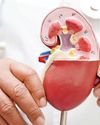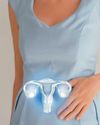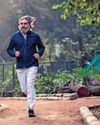
It was March 2016. Mandeep Mann-then a young management graduate-turned-IT professional, ambitious and enterprising, an adventure junkie and fitness freak-had just parked his car in the parking lot when he chanced upon a blood donation drive poster. Mann had always been an eager volunteer. At 36, he had donated at least 20 times, if not more.
As someone in a leadership role in a reputed IT firm, he had his plate full. Still, he took out time to donate blood yet again. Just as he was leaving from the blood donation centre for work, a volunteer from the DKMSBMST Foundation India, an NGO focusing on fighting blood cancer, asked if he would like to consider donating his stem cells, too, "because that way you could save lives of those suffering from life-threatening blood disorders and cancer". Of all the things she said, the word 'cancer' stuck with him. It had been a year since his wife had been diagnosed with breast cancer. They had met through common friends and Mann was besotted by her zest for life and charm. But now ever since the diagnosis, he could see her energy ebbing away. Though he had never heard of stem cells before nor had an idea of what he was in for, he knew he had to do anything that could potentially save someone from cancer's grip. He signed up. They took his cheek swab sample, exactly the way it is done for Covid-19 testing. After an examination of his sample, Mann entered DKMS-BMST's global registry of potential stem cell donors. This meant that he would be able to donate his healthy blood stem cells to a cancer patient whose blood cells were all infected. These healthy blood cells will then multiply and grow in a cancer patient's body, thereby giving a fresh lease of life to someone who otherwise had no chance of survival.
This story is from the {{IssueName}} edition of {{MagazineName}}.
Start your 7-day Magzter GOLD free trial to access thousands of curated premium stories, and 9,000+ magazines and newspapers.
Already a subscriber ? Sign In
This story is from the {{IssueName}} edition of {{MagazineName}}.
Start your 7-day Magzter GOLD free trial to access thousands of curated premium stories, and 9,000+ magazines and newspapers.
Already a subscriber? Sign In

WHEN THE FILTERS FAIL
With chronic kidney disease on the rise in India, THE WEEK spoke to four patients to chronicle their struggles and hopes

STROKE SURVIVORS HAVE A HIGHER RISK OF DEMENTIA
ABOUT ONE-FIFTH OF STROKE survivors will eventually get a diagnosis of dementia, finds a Canadian study published in the journal Neurology.

Highs and lows of aviation safety
A recent spate of fatal air accidents around the world has once again sparked a debate about aviation safety. With India's aviation sector being the fastest growing in the world, this should interest all Indians. As an active pilot for three decades, it is certainly of great interest to me.

IS SEATED OR SUPINE BLOOD PRESSURE MEASUREMENT MORE ACCURATE?
A STUDY FROM HARVARD UNIVERSITY, published in JAMA Cardiology, found that patients who had elevated blood pressure while lying down (supine position) were at a higher risk for heart disease, stroke, and death-even if their seated blood pressure readings were normal.

Beating cervical cancer
When detected early, it is highly treatable with good outcomes

REGULAR FLOSSING MAY REDUCE RISK OF STROKE/AFIB
REGULARLY FLOSSING YOUR TEETH may not only protect your gums, but also lower your risk of stroke as well as irregular heart rhythms such as atrial fibrillation.

TWIN PREGNANCIES DOUBLE THE RISK OF HEART DISEASE
MOTHERS OF TWINS are twice as likely to be hospitalised for heart disease in the year after delivery, according to a US study published in the European Heart Journal. The risk is even greater for mothers of twins who had high blood pressure during pregnancy.

Banking on biosimilars
The pharmaceutical industry is experiencing a biosimilar boom, and India is among the best-positioned countries to capitalise on it. Biosimilars are biological medicines that closely resemble an already-approved reference biologic.

PREHABILITATION BEFORE SURGERY IMPROVES OUTCOMES
WHAT IS PREHABILITATION, or prehab? It refers to the process of preparing for a surgery by exercising and eating a nutritious diet to improve surgical outcomes.

CULTURE IN A CLAY POT
Chef Regi Mathew takes Kerala cuisine to New York with Chatti, hoping to showcase the immense potential of Indian regional food